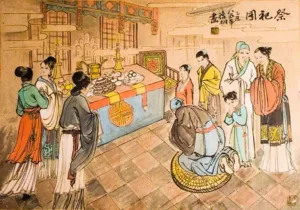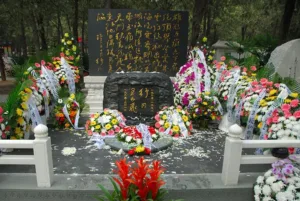Cheng Ming Festival
By Sharon Schweitzer
The Ching Ming Festival, also known as Qingming (清明节), is a Chinese custom celebrated worldwide by people of many Asian cultures. Sometimes called Tomb Sweeping Day or the Pure Brightness Festival (pure brightness is the English translation of Qingming), it’s an annual event to remember and honor ancestors and celebrate the warming weather. It’s both reverent and fun.
Qingming dates back more than 2,500 years, to ~636 B.C. Duke Mu of Qin (秦穆公) declared a period of three days without fire to mourn his loyal servant Jie Zitui (介子推), whom the duke accidentally killed. The event was known as the Hanshi Festival, the Cold Food Festival (寒食節) or Smoke Banning Festival. The present observance of the holiday is credited to Emperor Xuanzong of Tang, who declared a formal holiday for the Chinese to respect their ancestors to prevent wealthy citizens from holding too many extravagant ceremonies.
Qingming always falls on the first day of the fifth solar term of the traditional Chinese calendar, which is the 15th day after the spring equinox: April 4, 5 or 6.
A modern-day Ching Ming Festival is a time of reflection and remembering those who have passed. Families visit the cemeteries where their loved ones are buried and tidy up the gravesites. They sweep and pull weeds from the places where their loved ones rest and make repairs if needed. They place fresh flowers, willow branches (said to ward off unwelcome ghosts) and food offerings on the graves.
They may burn joss paper money (金紙) and other objects—cars, houses, clothes, jewelry—in support of their loved ones’ happiness in the afterlife. They may also burn incense and light firecrackers to alert their ancestors of the family’s presence and scare away evil spirits.
Traditional Ching Ming foods include sweet green rice balls, peach blossom porridge, crispy cakes, snails and eggs. Because of the historical significance of cold food, these foods are usually cooked a day or two ahead of time.
The head of the household usually begins by bowing three times with the wine cup in hand, then pouring the wine on the ground just in front of the headstone. This procedure is usually repeated three times. Each member of the family comes in front of the headstone and bows three times with the right fist held cupped in the left hand. Some families will then eat the food together there at the gravesite, similar to having a picnic with their deceased relatives. It is said to bring good luck to eat the food that was offered to the deceased.
In addition, some families will begin by setting off firecrackers to scare off evil spirits and to alert the deceased relatives that they are there to pay their respects.
Today, the responsibility to hang san or ’walk the mountain’ as visiting the cemetery is commonly known, still falls to the eldest son. Today families may be more likely to prefer simplified offerings of only the incense, paper money and flowers.
Photo by Photos by studycli.org/
Sharon Schweitzer JD, is a diversity and inclusion consultant, cross-cultural trainer, etiquette expert, and the founder of Access to Culture. In addition to her accreditation in intercultural management from the HOFSTEDE Centre, she is an attorney and mediator. Sharon served as a Chinese Ceremonial Dining Etiquette Specialist in the documentary series Confucius was a Foodie, on Nat Geo People. Her Amazon #1 Best Selling book in International Business, Access to Asia: Your Multicultural Business Guide, won a coveted Kirkus Star, and was named to Kirkus Reviews’ Best Books. She’s a winner of numerous awards, including the British Airways International Trade Award at the Greater Austin Business Awards.
#SharonSchweitzer, #AccesstoCulture, Access2Culture, #InternationalCelebration, #AccesstoAsia, #GlobalEtiquette, #Cross-CulturalTrainer, #InterculturalCommunication, #InternationalCommunication, #Interculturalist, #Etiquette, #CultureExpert, #Speaker, #KeynoteSpeaker, #AsianCulture, #ChingMingFestival, #China, #CulturalTraditions, #Festivals, #ReligiousCelebrations, #InternationalObservances, #Language&Culture



Leave A Comment